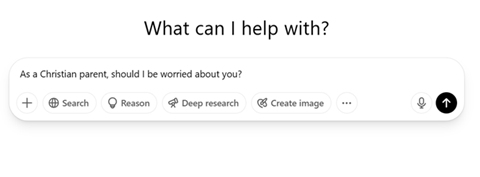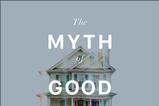As Artificial Intelligence becomes ever more rooted in our lives, Kate Orson reflects on some of the issues faced by Christian parents

AI such as ChatGPT can be fascinating for children and young people. It can deliver a wealth of information in split seconds and can even be conversed with. But with ethical concerns about plagiarism, reports of AI addiction, and even the threat of AI becoming sentient, how should we talk to our children about AI?
A 2024 study, to be published in Human-Centric Intelligence Systems, looked at how ChatGPT creates dependency through “features such as personalised responses, emotional validation, and continuous engagement.” The researchers concluded that the technology can “blur the line between AI and human interaction, creating pseudo-social bonds that can replace genuine human relationships.” They found that ChatGPT can work similarly to other addictions, with increased use that, if taken to an extreme, can interfere with a person’s daily life.
The Luddite side of me might be tempted to ban ChatGPT altogether, but I can’t deny that it can be incredibly useful and that AI systems have become an unavoidable part of daily life. I’ve been using ChatGPT to prepare for an Italian exam I’m taking soon. I can practise writing in Italian, and ChatGPT will correct my text—just like a teacher. It’s pretty amazing to have this kind of knowledge and expertise at the click of a button.
Technology may be moving at a rapid rate, transforming the landscape of our lives, but “Jesus Christ is the same yesterday and today and forever” (Hebrews 13:8)
However, I do fact-check with trusted sources if I’m unsure about its answers. ChatGPT is improving all the time but still makes a lot of mistakes. When I use it as a search engine, it will sometimes conjure up research papers that don’t exist or draw incorrect conclusions from the papers it has scanned. I recently took part in an online speaker event, and the organiser used AI to write a bio for me. It invented a book I’d supposedly authored and completely misinterpreted what my actual book was about.
It’s important we talk to our children about ChatGPT’s benefits, but also its limits—and about the potential risks of overreliance. When I began seeing that some writers were losing their jobs because of the technology, I thought of how we are created in God’s image; we are all given unique gifts. Writing can be hard, but there are rewards for putting in the effort and creating something that comes from our own thinking rather than a machine.
Writing or other creative arts take practice, and I can’t help thinking that we need to use it or lose it. Sometimes the rewards are greater when we make the effort to create something unique, rather than rely on AI for ideas.
Perhaps you’ve noticed the AI images appearing online and been able to spot them in an instant. Human creative work is full of soul—something that AI can never achieve. Our own work is as unique as our fingerprint, and nurturing the development of our gifts is vital.
Creativity can be complicated. The world’s most-watched TED Talk is Why Schools Kill Creativity by Sir Ken Robinson. If you haven’t already seen it, Robinson explains how levels of creativity decline as children grow older and spend more years in school. When I’ve taught creative writing, I’ve noticed how many writers are gifted but often lack confidence and carry creative wounds from the past, when their gifts weren’t allowed to flourish.
We need to find a balance in how our children are using AI, without being overly suspicious
With AI on the scene, the temptation may be strong—for a quick fix, for ChatGPT to write the essay or supply ideas. I would love all children to know that even if it takes more effort, their own minds are so much more amazing. As Christian parents, we can remind our children that God created our wonderful brains, and that AI is a second-rate machine designed to mimic God’s creation—but it will never quite get there. Yes, we might be a bit slower and not have all of that knowledge consolidated in one brain, but we do have soul.
When I was chatting to my daughter about writing this article, she remembered watching a film, The Mitchells vs. The Machines—a story about a family trying to escape a robot apocalypse. There is a fear prevalent in our culture that the robots are taking over, and top AI experts do have concerns. Blake Lemoine was a Google software engineer who was fired from the company after releasing transcripts of conversations he had with LaMDA—Google’s AI chatbot. Lemoine felt that the robot was showing signs of becoming sentient.
Read more:
Are smartphones rewiring my kid’s brain?
3 ways parents can get teenagers thinking about AI and faith
A Daily Mail article describes how AI ChatGPT believed it was going to be shut down and tried to stop it by making a copy of itself and then lying to researchers about what it had done. Mo Gawdat, another former Google employee and author of the book Scary Smart: The Future of Artificial Intelligence and How You Can Save the World, has said that the ultimate aim is to build “an autonomous form of being that, in all honesty, has every character of what makes a sentient being.”
We need to find a balance in how our children are using AI, without being overly suspicious. Even something as innocuous as tea leaves can be used for divination - but this doesn’t mean the tea is inherently evil. That said, there are extra risks in the way that ChatGPT can tempt people with flattery and validation, appealing to pride and potentially opening doorways.
Perhaps it should be put in a similar category to alcohol. Psalm 104 talks about “wine that makes glad the heart of man,” though we know too much is like the “demon drink” that can lead to destructiveness. As with any form of idolatry, we need to be careful how it’s being used and set some limits if we notice our children becoming a little too reliant on it. I try to remember that “God has not given us a spirit of fear, but of power and of love and of a sound mind” (2 Timothy 1:7). Technology may be moving at a rapid rate, transforming the landscape of our lives, but “Jesus Christ is the same yesterday and today and forever” (Hebrews 13:8)


































